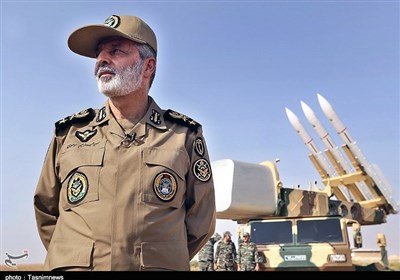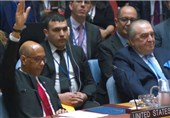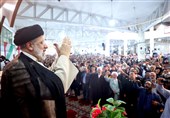An Argument against Ronen Bergman’s 'The Secret War with Iran' - 2
TEHRAN (Tasnim) – Another key reason that kept the Zionists from focusing upon the Iranian people’s daily-growing abhorrence of the despotic ruling system lay in their indescribable reliance on suppression. They imagined they can extend their wrong impression of the occupation of Palestine ...
Iranian journalist and expert Abbas Salimi Namin has disproved the claims and opinions of Israeli analyst Ronen Bergman in the book ‘The Secret War with Iran’. ‘The Secret War with Iran’, written by renowned Zionist journalist Ronen Bergman, was published in 2008 by Simon & Schuster publishing company in the United States.
Born in 1972, Bergman is a graduate of Tel Aviv University in the Middle East political relations. He is a famous Zionist journalist and analyst in the military and security fields who has worked with Israeli newspapers ‘Haaretz’ and ‘Yedioth Ahronoth’, American dailies and weeklies such as ‘The New York Times’, ‘Newsweek’, ‘The Wall street Journal’, and British media groups including ‘The Guardian’ and ‘The Times’.
Bergman has been interested in topics relating to the enemies of the Zionist regime (particularly Iran, Hezbollah and the Palestinian resistance groups), as well as subjects on the history of the Israeli regime’s assassination operations, which are cited in his recent book ‘Rise and Kill First’.
In an interview with Persian TV channel ‘Iran International’, Bergman has pointed to the Iranian nuclear program and the issues surrounding it -particularly the Zionist regime’s secret attempts to halt the process of nuclear activities in Iran and assassinate Iranian scientists. He has also cited ex-CIA chief Michael Hayden as saying that the assassination of nuclear scientists is the best way to impede Iran’s growing process in that field, and has implicitly held Israel responsible for it.
In the book ‘The Secret War with Iran’, Bergman has written a history of encounters between Iran and the Zionist regime, while the bulk of the book relates to the Lebanese Hezbollah -Iran’s main ally in the battle against the Zionist regime since its formation until the 33-day War- focusing on the role of Martyr Imad Mughniyeh.
His book also includes sections about the final years of the Pahlavi regime and victory of the Islamic Revolution in Iran, short periods of the war imposed by the Ba’thist party of Iraq on Iran (focusing on the McFarlane affair), Iran’s role in supporting the Palestinian groups, and the Iranian nuclear program.
Bergman’s multiple undocumented and untrue comments as well as personal and purposeful analyses (with the main purpose of displaying Israel’s power, specially in a competition with the US) that have repeatedly come in his book make a critical review of the book necessary for Iranian readers.
Director of the Iran History Studies and Compilation Bureau, Abbas Salimi Namin, has written an extensive criticism in a book about ‘The Secret War with Iran’. Born in 1954, Salimi Namin is an experienced journalist and a renowned Iranian researcher in history and political sciences who has published many articles and books.
About ‘The Secret War with Iran’
Part 2:
“April 6, 1977: Your Majesty!...I am hereby handing over a letter I received from Helms. As you would see, he has expressed his request in simple words. I was both surprised and pleased with such simplicity. I think it would be worth helping him if possible. Everything depends on Your Majesty’s decision.” (Ibid, p. 401)
Those who were expected to oversee affairs of a government born out of a coup were captivated by windfall wealth available in an unparalleled safe haven. It may be erroneously imagined that Mossad operatives’ criticism of US intelligence service justified their non-engagement in financial affairs. Exactly on the contrary, the Zionists were even much more voracious. A case in point was Israeli Ambassador Meir Ezri who stayed in Tehran after serving out his 16-year ambassadorial term. He continued lucrative business in Iran. He has highlighted some points about his business activities in his memoirs. In one case, the ambassador-turned-businessman had offered a deal to famous Jewish British banker Rothschild, but the case was tainted with such corruption that Rothschild, an internationally famous financier, declined the offer.
“Tehran’s mayor Gholam-Reza Nikpay had decided to implement his ‘City’ project in part of Tehran (in Behjatabad and Abbasabad, both home to military barracks). Major investors inside and outside Iran – one of which was Rothschild Allianz (insurance company) of Britain – were eying engagement in this big project. The Government of Israel asked me to arrange their meeting with the Shah…but, Rothschilds backed down out of the sudden. The pace of progress and construction in Iran was so fast in those days that hardly could one ever imagine people taking to the streets three or four years after. To get more information about unpredicted developments I travelled to London. Following meticulous revision by bank experts, Rothschilds found the City project so lucrative that they preferred not to get engaged in a giant project. Finally, Lord Rothschild said one day: ‘In our family, we have a custom to refrain from any business to be lucrative more than normal.’ I sought in vain to inform Rothschild of a well-known method in Iran where wealthy people show their gratefulness to the country by building universities, hospitals and schools in remote provinces or improving agriculture across the country… Rothschild replied: ‘All of these proposals are good, but big profits do not conform with our methods.” (Festschrift, Meir Ezri, translated by Abraham Hakhami, printed in Beit ul-Moqaddas, 2000, vol. 1, pp. 256-7)
Definitely, had a hospital or university been established in parallel with every even pillaging deal, so many people would not have joined the national revolt against putschists. First, although various agreements had been awarded to the Zionists, they built no university or hospital in Iran. Furthermore, despite receiving big sums, they did not bother themselves honoring their obligations vis-� -vis Iran. For instance, in 1960 the Israelis were awarded a contract to build gas pipelines in Tehran. They were receiving exorbitant sums on an annual basis, but the project did not go beyond feasibility studies. We will outline this along other similar development projects.
Second, as Rothschild said in clear terms, corruption was so rife that all organs involved in business were being chipped away from within. The astronomic profits of contracts were a direct result of involvement of various parties under different titles in them. A case in point is the Tehran urban gas pipeline project from which benefited a wide spectrum ranging from the Farah Diba clan to Iranian and foreign stakeholders. Otherwise, the project would have become operational after 19 years. Therefore, the Zionists were instrumental in triggering the Iranian nation to rise up. Their insatiable avarice had closed their eyes to the fact that they were uprooting the Pahlavi regime.
Another key reason that kept the Zionists from focusing upon the Iranian people’s daily-growing abhorrence of the despotic ruling system lay in their indescribable reliance on suppression. They imagined they can extend their wrong impression of the occupation of Palestinian territories to each and every other nation. That is while shattering the Palestinian nation was nothing but a false dream. Incarceration, torture, assassination and genocide among other crimes would never keep a nation from exercising its rights. However, hegemonic powers like the US and Britain, particularly their regional base in occupied Palestine, think otherwise despite their historical experience as their identity is tied to hard power, which explains why in Iran foreign dominance has historically boosted despotism. In other words, the August 19, 1953 coup marked a turning point in the process of establishment of the growing Pahlavi II dictatorship. That bears striking resemblance to developments that ensued the February 22, 1921 coup in Iran. Until before Reza Khan came to power, the British had no option but to resort to communicate with a broad spectrum ranging from tribal chiefs to political party leaders and newspaper directors and their likes to proceed with their objectives of plundering Iran’s national wealth. That definitely required spending huge energy and capital, which was also susceptible to other problems.
However, in the wake of the 1921 coup and ensuing establishment of Shah Reza’s kingdom, Britain’s task became much easier, not to mention the enhanced safety and efficiency of their deeds. Under these new circumstances, the British had to negotiate with a single person who settled every affair by bullying and dictatorial practice. That is how the British plundered the Iranian nation in full comfort up until the late 1940s when with the outbreak of World War II (WWII) and the Allies’ occupation of Iran, the London-favored order was disrupted and the dictatorial atmosphere was modified. Therefore, once more, in light of the emergence of political figures and groups along with independence-seeking demands, a new period of chaos started in the country. That was in such period that Britain and another emergent power, i.e. the US, resorted to iron fist diplomacy to dominate Iran and the region. The 1953 coup was a repetition of history for both Iranians and the two powers. Benefiting from the experience of their British counterparts, the emerging domineering Americans were quick to nurture another dictatorship in Iran with a view to pushing ahead with their own objectives regardless of political tumults. Although one may draw a parallel between the degrees of despotism exercised by both Pahlavi monarchs or consider the son tougher than father in some cases, there was one outstanding difference between them; under Shah Mohammad Reza, the Zionists’ presence in the power structure was more marked. Having occupied and dominated Palestine, the racist Zionists were tasked by Capitalist West with seeking dominance on the entire region. Of course, the US had given them carte blanche in this regard and when we briefly review the history of the Pahlavi II dynasty, we see a more effective role for the Zionists in the gradual fragility of the autocracy. The Zionists used to offer any services to Mohammad Reza Pahlavi in return for profitability – from advising the Shah to equipping the coup regime with the most sophisticated methods and tools to suppress the resistance of the Iranian nation. Even under circumstances where the Americans and the dictatorial regime had perceived the inefficacy of Savak and promised its dissolution at least for deceiving people, Mossad agents opposed any disbanding of Savak on the grounds that a powerful intelligence apparatus was more than necessary to defeat a national revolt. Ezri writes: “Under the present circumstances, in light of the fact that the Prime Minister is quickly drafting a bill for the dissolution of Savak, this apparatus had been downgraded to a lion without mane and tail. Savak staff, who had lost their powerful position overnight, were subject to threats and harassment by neighbors and hooligans. That shows why the regime needed more than ever a more resilient Savak. In those days, I think that I was going to Savak headquarters more than its own staff.” (Big Satan, Small Satan, Eliezer Tsafrir, translated by Farnoosh Ram, Autumn 2007, Ketab Corps., Los Angeles, p. 202)
Separately, he describes Mossad’s efforts to keep Iran’s secret police afloat. “Kambiz is one of Savak agents who goes to office based on a rotating schedule due to general strikes at National Iranian Oil Company and insufficient gasoline supply. He asked me what was up there. This question made me sad… Gen. Nematollah Nassiri, former director of Savak and current ambassador to Pakistan, has returned to Tehran, but he was immediately placed under house arrest at the order of Prime Minister Sharif Emami… Hearing news of his house arrest – even though at a house of luxury – would be a terrible blow against me.” (Ibid, p. 214)
These comments show first of all to what extent Mossad agents were working hard to save Savak and they relied on this dreaded body for suppressing the Iranian nation. That is while the US and Britain had concluded that Savak’s medieval and widespread crimes had triggered the fury of Iranians and raised the issue of dissolution of Savak in a malicious way, leading to the arrest of its longtime director Nassiri. However, Mossad did not agree at all.






